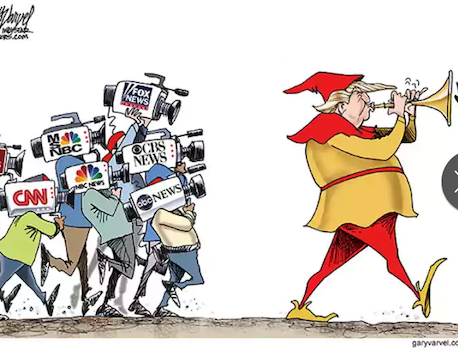The Reuters news agency says covering Washington DC is now on a par with reporting from dictatorships. Is this the right thing for journalists? Doc Martin reviews the advice being given to reporters facing Donald Trump’s shock doctrine tactics.
IT DIDN'T take long. About ten days. But now it is very clear that the White House is at war with large sections of the American – and, indeed, the global – news media.
Trump incessantly tweets about the “failing” New York Times, this week suggesting it should be sold and its print edition shut down. The White House is also refusing to send Trump “surrogates” to CNN talk shows as a way of bullying the organisation. This tactic seems to be working, CNN has dropped its initial decision not to broadcast Sean Spicer’s press briefings live.
Somebody with aptitude and conviction should buy the FAKE NEWS and failing @nytimes and either run it correctly or let it fold with dignity!
— Donald J. Trump (@realDonaldTrump) January 29, 2017\\\\\\\\\\\\\\\\\\\\\\\\\\\\\\\\\\\\\\\\\\\\\\\\\\\\\\\\\\\\\\\\\\\\\\\\\\\\\\\\\\\\\\\\\\\\\\\\\\\\\\\\\\\\\\\\\\\\\\\\\\\\\\\\\\\\\\\\\\\\\\\\\\\\\\\\\\\\\\\\\\\\\\\\\\\\\\\\\\\\\\\\\\\\\\\\\\\\\\\\\\\\\\\\\\\\\\\\\\\\\\\\\\\\\\\\\\\\\\\\\\\\\\\\\\\\\\\\
This is a war the news media knew was coming. It’s not like Trump kept his hatred of the New York Times, The Washington Post and CNN secret. He’s been tweeting his bile and outright lies about the media for months now.
Trump’s cultivated hostility to certain sections of the news media – he is very benevolent towards the pro-Trump media – is causing conniptions among executives and editors. It is prompting deep soul-searching and even causing some outlets to reconsider their whole Washington DC news coverage.
Globally-respected journalism academic, Jay Rosen, has told IA that the White House approach to controlling press briefings is
“... as bad as I thought it would be, with ‘the media’ getting blamed for what the White House or Trump screwed up.”
Rosen is associate professor of journalism at New York University and has been critical of Trump’s media strategy for some time.

(Source: @ethicalmartini screenshot)
He also recently argued that any journalistic rationale for interviewing White House surrogates like Kellyanne Conway has evaporated because Trump’s mercurial personality means that any statements they make are likely to be contradicted at some point in the near future.
Said Rosen in a podcast for the Recode website:
The logic is, this is a representative of the president. This is somebody who can speak for the Trump Administration. But if we find that what Kellyanne Conway says is routinely or easily contradicted by Donald Trump, then that rationale disappears.
Another reason to interview Kellyanne Conway is our viewers want to understand how the Trump world thinks, but if the end result of an interview is more confusion about what the Trump world thinks, then that rationale evaporates.
We’ve known about the Trump problem for quite a while
Journalists started writing "How to cover Trump" stories as early as March last year and there’s been a veritable flood of them since.

(Source: screenshot)
Admittedly, the New Yorker piece was very much tongue-in-cheek, but it made the point that his presidential campaign had turned political reporting on its head and “business as usual” was not going to be good enough.
Experienced journalist and Murdoch-biographer, Michael Wolff took the question more seriously in a piece for USA Today a couple of weeks ago:
‘How do we cover Donald Trump? That’s the confounding, or, in some cases, head-exploding question being asked in every news organization.’
Indeed, it may well be a “head-exploding” question given the breakneck speed at which Trump and his closest advisors are implementing what can only be described as a Shock Doctrine approach?
"Naomi Klein describes the shock doctrine
as ‘the rapid-fire corporate reengineering
of societies still reeling from shock’.
This is clearly now the foundation
for the Trump playbook."
Journalists need to avoid falling into the shock doctrine syndrome of paralysis and fear, to do this, Michael Wolff argues, reporters and editors should not take Trump’s “bait” and should not respond in-kind when he insults them. He also references the Trumpist “movement”, which, while only loosely-defined, indicates that he does have a base among some voters; particularly those who are already pre-conditioned to hate the liberal media establishment.
Wrote Wolff:
‘It’s not so much Trump that the media doesn’t know how to cover, but a social movement that sees the media as one of its significant enemies. In this, Trump’s behavior, his constant tweets, his tit for tats, his free associations, his high baloney quotient are all designed to disrupt the media foe, and, among other things, give it a nervous breakdown.’
If the news media allows itself to be distracted by this, Wolff argues, it cannot do its job.
A few days ago, public broadcaster NPR held a Round Table on the issue of covering Trump with three senior reporters; John Daniszewski from the Associated Press, Margaret Sullivan from The Washington Post and Elizabeth Spayd from The New York Times. The trio discussed the media's role in covering this political climate with host Michel Martin.
The panel was clear that calling a “lie” a “lie” was important, but that such terminology has to be used judiciously, lest audiences just turn off. This is a common refrain and the Trump team is conscious that getting at least some of the audience to give up on the news because it’s too confusing is a useful Shock Doctrine tactic. It is also clear that, for the NYT and other media outlets, a higher level of controlled push-back against the White House will be necessary if they are to overcome the tsunami of lies and aggression heading their way.
Can the media learn to act differently?
The Reuters news agency is one organisation trying to rapidly adjust to the changed dynamics in the U.S. capital.
In a message to staff earlier this week, Reuters editor-in-chief Stephen Adler wrote about covering President Trump the Reuters way:
‘The first 12 days of the Trump presidency (yes, that’s all it’s been!) have been memorable for all – and especially challenging for us in the news business. It’s not every day that a U.S. president calls journalists “among the most dishonest human beings on earth” or that his chief strategist dubs the media “the opposition party.” It’s hardly surprising that the air is thick with questions and theories about how to cover the new Administration.’
Adler’s advice to Reuters’ staff is direct and simple: covering the U.S. Government may well become as difficult as covering authoritarian regimes in other nations. He specifically mentions several dictatorships:
‘Turkey, the Philippines, Egypt, Iraq, Yemen, Thailand, China, Zimbabwe, and Russia, nations in which we sometimes encounter some combination of censorship, legal prosecution, visa denials, and even physical threats to our journalists.’
That is has come to this is a damning indictment of the Trump regime and a clear signal that life is going to get a whole lot tougher for reporters covering the White House.

Reuters instructions to journalists covering American politics (Source: screenshot)
Among media and journalism academics there is also an intense debate, particularly about calling out Donald Trump’s twisting of the truth. For teachers of journalism, me included, there are fundamental ethical, as well as practical, issues. If a whole generation grows up thinking that "alternative facts" are as good as the truth, journalists of the future are, to put it bluntly, fucked.
One of the first to openly suggest calling the President’s misuse of the facts “lying” was Dan Gillmor from Arizona State University, where he is director of the Tow-Knight Center for Digital Media Entrepreneurship.
In March 2016, Gillmor was already aware of the problems confronting journalist trying to cover Trump’s campaign — they were discombobulated by his bombast, aggression and proclivity for lying, but they didn’t know how to respond.
At the time, Gillmor wrote this:
The Donald Trumps of our culture couldn’t have asked for a better climate in which to wage war on the political establishment, immigrants, Muslims, and truth. Our media lap it up, handing the demagogues the megaphones; they drive ratings and mouse clicks.
Journalists are having qualms, at least. In the past few months, there has been quite a bit of “what should we do about Trump?” conversation in public and private settings. At some level, journalists recognize that they can’t — or at least shouldn’t — sit still as Trump and other candidates lie and pitch the kinds of authoritarian “solutions” that would lead to drastic curbs on liberty.
The right response, however, would take most political reporters and editors out of their comfort zones, where they profess what my friend, the press critic and reviewer Jay Rosen, calls the ‘view from nowhere’ — being above it all, and opting not to know or care who’s telling the truth. Reporters behave as if they have an absurd obligation to let politicians attack fundamental liberties, without which robust journalism can’t exist in the first place, without pushing back.
Gillmor’s advice at the time – nearly a year ago, now – was simple and to the point:
‘So what should journalists do about Trump? They should do their jobs.’
Unfortunately, a bewildered and shell-shocked media did not, by-and-large, follow Dan’s advice then. So a few months later, he upped the ante.
‘If journalists want the public to retain even an ounce of respect for their craft, they should do more than that — and they should start right now, by declaring a boycott on bullshit,’ Gillmor wrote in September 2016.
In January, following Sean Spicer’s first brain-exploding appearance in the White House briefing room, Gillmor offered the following advice:
'First, major news organizations need to follow CNN’s lead and decline to air press briefings from known prevaricators live. Do what CNN did: Listen, separate truth from falsehood, and then report accurately.'
However, Gillmor told IA he’s “disappointed” that CNN has subsequently backed down on this bold move. The problem that Gillmor – and others – identify in relation to most mainstream coverage is that decades of comfortable insider lifestyles have led senior journalists (over several generations) to become too close to the power sources. A certain level of shared ideology and a sense of well-being, knowing that a centrist position and faux neutrality guarantees access, has led news organisations to become complacent and to forget that history doesn’t stop; the dialectic of social relations has a relentless momentum.
When this dialectic is ruptured by a powerful, malignant entity like Donald Trump and his entourage of rat-fucking fascist sympathisers, a complacent media gets quickly pushed aside. It takes time to recover from a beating but, slowly, some of the Washington DC press corps are coming around.
Perhaps the most provocative suggestion has come from NYU’s Jay Rosen. He has recently argued that the major news organisations should send interns to White House briefings.
Rosen says this would send a message that the media won’t cooperate with the circus:
‘They don’t have to lend talent or prestige to it. They don’t have to be props. They need not televise the spectacle live (CNN didn’t carry Spicer’s rant) and they don’t have to send their top people.’
Rosen’s point is that political reporting should be “outside in” rather than from the inside.
He says that instead of taking its cues from what the White House is saying in carefully controlled briefings, journalists should initiate stories from outside the Washington bubble:
‘When I say #sendtheinterns I mean it literally: take a bold decision to put your most junior people in the briefing room. Recognize that the real story is elsewhere, and most likely hidden. That’s why the experienced reporters need to be taken out of the White House, and put on other assignments.’
Like @jayrosen_nyu says, #sendtheinterns to #WhiteHouse #pressers. | #journalism #media https://t.co/mDK9gRgSdl pic.twitter.com/csej9f1geS
— GreyDrαne (@simplygrey) January 24, 2017
In an email conversation with IA, Rosen said it is “disheartening” to see the White House press pack seemingly allow itself to be silenced by the lure of background briefings from officials they are not allowed to name. He cited this story in the Washington Post as an example of a White House outrage that was allowed to pass 'without revolt' by the assembled media.
Reading the WaPo story by White House correspondent Jenna Johnson, it is easy to see why Rosen is disappointed. It is a great example of the “inside-out” approach he is so critical of. Johnson meekly goes along with the lines being pushed by officials she is not allowed to name. In parts, it reads like a transcript that the press office might issue.
Jay Rosen told IA that the situation hasn’t changed much in two weeks, but adds “there has been some admirably aggressive coverage and a lot of leaking from people inside clearly disturbed about what is happening,” which is encouraging.
Dan Gillmor does not appear to be overly optimistic, either. In a message to IA, he could only cite two positive moves by the Washington DC media: assigning more investigative journalists to the beat (which both the WaPo and the NYT have done) and encouraging people to use anonymous dropboxes to safely leak material to the media (see Dan Gillmore's Tweet above).
You can read more by IA's political editor Dr Martin Hirst on his blog Ethical Martini and follow him on Twitter @ethicalmartini.
'Fox News Sunday' just turned against Donald Trump & it was SPECTACULAR! Published 22 January 2017.

This work is licensed under a Creative Commons Attribution-NonCommercial-NoDerivs 3.0 Australia License
Great, concise notes from Reuters on how journalists should cover Trump and the American political landscape. https://t.co/YHof5skPwB pic.twitter.com/W9Gabqnh20
— Julia Ritchey (@juliaritchey) February 1, 2017
Monthly Donation
Single Donation
Get the truth! Subscribe to IA for just $5.











